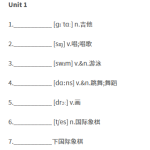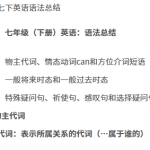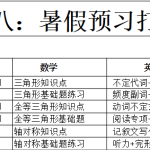知识点复盘(U5-8)2024-2025学年译林版(2024)七年级英语下册
新译林7B 期末知识点复盘(U5-8)
Unit 5 Animal friends
- They taste thingswith their feet.(P57)
介词,用,使用
taste v.尝,品;吃,喝(实义动词)
linking v. 尝起来;有…味道(后接形容词作表语)
- 品尝;味道,滋味
n.鉴赏力;欣赏力
2.They are awake at night and can eat up to 1,200 insects in an hour.(P57)
(1) awake adj.醒着(可作表语或宾语补足语,不可位于名词前作定语)
be wide awake毫无睡意
- 醒;唤醒 wake up醒来;唤醒
(2) up to 达到(某数量、程度等),至多有(后常跟数词)
live up to 表示“活到….(岁)” be up to sb. 是….的职责;由….决定
3.They can lift things 50 times their own weight.(P57)
(1) lift v.举起 ;抬高(相当于lift up)
(可数名词)电梯 :take the lift乘电梯
(可数名词)搭便车:give sb. a lift让某人搭便车
- weight n.重量(可数名词和不可数名词均可) the weight of…. ….的重量
lose weight减肥
put on/gain weight体重增加
- “……有多重?”的表达方式: What’s the weight of….?
How heavy is/are….?
How much do/does …. weigh?
拓展:weigh v.有….重;称重量
4.They take in air through the holes on both sides of their body.(P57)
through prep.穿过,通过;以,凭借(表示方式);自始至终,从头到尾
| through | 强调从物体内部穿过,如门、
窗、洞、隧道等。 |
| across | 强调从物体表面横过,如
穿过马路、街道、草地等 |
辨:
5.My dog is the cleverest animal of all.(P58)
cleverest adj. 最聪明的
( cleverest 是形容词clever的最高级形式。单音节和部分双音节形容词的最高级一般是在形容词后面加-est,常译为“最…..的”,且常与定冠词the连用)
6.And loves to collect sticks.(P58)
stick n.枝条;棍(可数名词) collect sticks捡树枝 dry sticks干树枝
a walking stick一根拐棍
- 将….刺入;刺;粘贴 (过去式: stuck)
stick to (doing) sth.坚持(做)某事
7.And doesn’t like fights.(P58) 名词 动词
fight n. & v. 打架(过去式:fought)have a fight with sb. = fight with sb.与某人打架
- 争吵;争论 fight with sb.和某人争吵 fight about/over sth.为某事而争论
8.And I’ll look after him till the end.(P58)
(1) look after 照料 (=take care of) 好好照顾…. look after…well
take good care of…..
拓展:look的相关短语还有:look for寻找 look at看 look up查阅;向上看
look out小心,当心 look through 浏览
look around环视
look forward to盼望 look like看起来像
(2)till prep.到….时;直到…..为止
(与until意思相近,后跟表示时间的名词/名词短语,常与延续性动词连用)
conj. (=until)可引导时间状语从句
not ….till/ until…..直到….才……
9.Way up into the sky.(P58)
way adv.很远;大量(常与介词或副词连用)
eg.: This skirt is way(= a lot) too short.这条裙子太短了。
10.But never forgets to come back to me.(P58)
forget vt. & vi.忘记做;遗忘 (过去式:forgot)
forget to do sth. 忘记要做某事(事情未做)
forget doing sth.忘记做过某事(事情已做)
11.When I’m lonely, she’s always there.(P58)
He doesn’t like to stay at home alone…….(P60)
lonely adj.孤独的 alone adj. & adv. 独自;单独
辨:
| lonely | 形容词 | “孤独的;寂寞的”,指情感上的孤独,带有伤感的色彩。 | |
| “荒凉的;偏僻的”,只用于名词前作定语。 | |||
| alone | 副词 | “独自;单独”,相当于by oneself。 | 强调独自一人的客观情况,不含情感色彩。 |
| 形容词 | “独处的;独自的”,常用作表语。 | ||
12.She can’t speak, but does care.(P58)
do起强调作用,表示“真的,的确”。在英语中,可以借助助动词do对谓语进行强调,do位于谓语动词前,且do有人称、数和事态的变化(do/does/did)。其强调作用的do要重读。
13.She is always by my side.(P58)
by sb.’s side 在某人身边 (相当于at sb.’s side)
拓展:与side相关的短语: side by side 并排;并肩地
from side to side左右来回(摇摆)
be on sb.’s side站在某人一边;和某人观点一致
on/from every side从四面八方;到处
14.The cat climbs trees a lot.(P59)
经常
拓展:
| a lot | 副词短语 | “非常”,可修饰形容词、副词或动词 |
| 名词短语 | “许多,大量”,常作宾语 | |
| a lot of | “许多,大量”,可修饰可数名词复数或不可数名词 | |
15.She is usually friendly, but be careful with your hands.(P60)
careful adj.小心的;细致的;慎重的 反义词:careless “粗心的,不小心的”
短语: be careful 小心,当心
be careful with…. 小心对待….
be careful of / about……小心/注意…..
be careful (not) to do sth.当心/注意(不要)做某事
拓展: care n.小心 carelessly adv.粗心地 carefully adv.小心地
carelessness n.粗心
16.He is very quiet and seldom makes any sound.(P60)
He seldom makes loud noises and he is always happy to see me.(P66)
sound n.声音 noise n.声音,噪音
辨:
| sound | 泛指自然界的各种声音。 |
| noise | 多指不悦耳的“噪声,喧闹声”等。 |
| voice | 指人的声音,如嗓音、说话声、歌唱声。 |
拓展:sound 连系动词,“听起来”,后常接形容词作表语。
sound like….听起来像…..
17.When she gets tired, she sleeps in the corner of her cage.(P61)
corner n.角落,墙角;街角;角
短语: at / on the corner of….. 在….的拐角处(多指位于某个平面的角/拐角)
in the corner of…. 在….的角落里(多指位于某个空间内部的角落)
around/round the corner很近;在附近
18.—May I touch your goldfish? —-Sorry, I’m afraid you can’t.(P62)
(1)touch v. & n.触摸,碰
- 感动;触动 touch sb.’s heart触动某人的内心
touch sb. deeply深深地触动某人
- 联系 be/get/keep in touch with…. 与….有/取得/保持联系
lose touch with…..与…..失去联系
(2)afraid adj.担心;害怕,恐惧(形容词,常作表语)
be afraid of sb./sth. 害怕某人/某物
be afraid to do sth.害怕/不敢做某事
be afraid of doing sth.害怕做某事
be afraid+( that)从句 恐怕……
I’m afraid so/not.恐怕是这样。/恐怕不是这样。
19.形容词的用法:
- 形容词作定语,常用于所修饰的名词或代词之前。
- 形容词作表语,常位于系动词(be、look、sound、get、turn、become等)之后,
说明主语的情况。
- 形容词作宾语补足语,常位于宾语之后,说明宾语的性质、特点等,
keep the room clean
- 形容词作状语,说明主语的情况,通常表示原因、结果或方式。
eg.: The children came back, hungry and tired.
- “the +形容词”表示一类人,相当于名词,可以作主语或宾语。作主语时,谓语
动词用复数形式。
20.情态动词can、could和may的用法:
(1)can和could的用法
|
用来谈论主语所具备的能力,意为“能,会”。 |
can表示主语现在所具备的能力,常与表示现在的时间状语连用。 |
| could表示主语过去所具备的能力,常与表示过去的时间状语连用。 | |
|
表示请求许可,意为“可以”。 |
表示请求对方允许时,两者均可用,此时could并不表示过去,而是表示一种更委婉的语气。could只用于一般疑问句,回答应用can,不用could。 |
|
表示对现在或将来的推测,意为“可能;会”。 |
can常用于否定句中,cannot
(can’t)表示“不可能”。 |
| could可用于肯定句和否定句。 |
(2)may 的用法
may是情态动词,可表示请求许可或征求同意,比较正式。
对含may的一般疑问句作答时,肯定回答常用“Yes,主语+can.”或“Yes,please/of course.”;否定回答常用“No, 主语+can’t.”或“Sorry, I’m afraid you can’t.”。
may也可表示推测,其过去式为might。
might 也可作情态动词,表示推测,但might表示的可能性比may小一些。
21.We don’t have to feed her much.(P63)
(1)have to 不得不
| have to | 1.常强调客观需要,多译为“不得不”。
2.有时态、人称和数的变化。其一般现在时的第三人称单数形式 为has to,过去式为had to。have to的否定形式为don’t have to,表示“不必”。 |
| must | 1.常表示说话人的主观看法,多译为“必须”。
2.没有时态、人称和数的变化。must的否定形式为mustn’t,表示“禁止,不准”。 |
辨:
(2)feed vt.喂养;饲养(过去式:fed) feed sb./sth.喂某人/某物
vt.养,养活(全家、一群人)
feed ….to…. 把….喂给…..
feed ….with…..用…..喂…..
feed on….(动物)以….为食
22.Tip for all animals(P64)
tip (可数名词) 实用的提示 tip on/for (doing) sth.(做)某事的实用提示
- 小费 v.给小费
- Radar allows ships to “see”things around them and travel safely.(P64)
(1) allow vt.使可能;允许 allow sb. to do sth.使某人有可能做某事;允许某人做某事
be allowed to do sth.被允许做某事
(2)safely adv.安全地 safe adj.安全的 safety n.安全 unsafe adj.不安全的
24.Bats make sounds, and then listen for the echo.(P64)
listen for sth.留心听(某种声音)(相当于listen out for sth.)
listen to(注意地)听
25.They cheer us up when we feel sad.(P65)
cheer vt.鼓舞 cheer (sb.) up(使)变得高兴,振奋起来
- & vi. 欢呼,加油 cheer sb. on(在比赛中)为某人加油,为某人打气
(可数名词)欢呼声;喝彩声
26.Also, some animals can be very useful, like dogs.(P65)
useful adj.有用的
(1)由“use(n.使用;用途)+-ful(形容词后缀)”构成,可在句中作定语或表语。
(2)useful的发音以辅音因素开头,其前如需不定冠词应用a。
(3)be useful to sb.对某人有用
be useful for (doing) sth.对(做)某事有用
27.They’re smart and even help people save lives.(P65)
save v.拯救,救助 save sb.’s life救某人的命
save sb./sth. from……拯救某人/某物,使之免于……
v.储蓄;攒钱;节约;节省
- That’s correct.(P65)
correct adj. 正确的 (同义词:right, 反义词:incorrect “不正确的”)correctly 副词
- 纠正;批改
- Animals and humans have a special relationship, and we should respect and care for all
living things.(P65)
- relationship n. 关系 have a close relationship with….与….关系亲密
由“relation(n.关系)+-ship(名词后缀)”构成。
词缀学习:-ship为常见的名词后缀,表示“性质;状态;品质”,由它构成的词还有friendship(友谊)、hardship(艰难)、ownership(所有权)等。
- care for照料(相当于look after或take care of);喜欢
- careabout关心;在意 take care当心;小心;保重 take care of照顾
作动词 作名词
- I have a pet guinea pignamed (P66)
过去分词短语作后置定语(相当于called)
过去分词短语作定语修饰名词时,通常放在名词的后面。
- He seldom makes loud noises and he is always happy to see me.(P66)
(1)loud adj.大声的 adv.响亮地,大声地
辨:
| loud | 形容词 | 侧重表示“声音响亮”,常在句中作表语或定语。 |
| 副词 | 常用在动词talk、speak、shout、laugh等后面。 | |
| loudly | 副词 | 由“loud(adj.响亮的;大声的)+-ly(副词后缀)”构成。强调声音高,
有时可与loud通用,但更具有“喧闹”地意味。 |
(2)be happy to do sth.很高兴做某事(相当于be glad/pleased to do sth.)
“be+adj.+to do sth.”结构地主语通常为人。该结构中的形容词通常为描述人的情绪
的形容词,如:sorry(难过的)、surprised(惊讶的)、excited(激动的)等。
- If I am down, Teddy will stay next to me and help me relax.(P66)
down adj.沮丧,情绪低落 feel down感到沮丧
(常用于连系动词之后作表语) be down in the mouth闷闷不乐;沮丧
let sb. down让某人失望
adv. 向下;朝下;在下面;(坐、倒、躺)下;减弱,降低
prep.(从高处)向下,往下;沿着;顺着;朝着
Unit 6 Beautiful landscapes
- Oceans cover about 71% of the earth’s surface.(P69)
cover v. 占(一片面积);覆盖;遮盖 cover…..with…..用….盖…..
be covered with….被….覆盖
- 足以支付;包含;涉及
n.(书刊的)封面,封皮;覆盖物;盖子
- Plains are open and flat. They cover over one-third of the world’s land area.(P69)
(1)flat adj.平坦的,平的
adv. 水平地;平直地
n..公寓,单元房
(2) land n.陆地;土地 不可数名词,与sea(海洋)相对。 on land在陆地上
by land走陆路
- 降落;着陆 反义短语:take off 起飞
- It rises in the mountains of Qinghai Province and runs all the way to the East China Sea.(P69)
rise vi.发源;上升;提高;增加 (过去式:rose)
n.上升;增强;提高
辨:
| rise | 不及物动词 | 意为“升起;上升;增加”,常指(日、月等)升起,
(数字、数量或价值等)增加。 |
| raise | 及物动词 | 意为“举起;提高(数量、水平等)”,发出此动作的
通常是人,如抬头、举手等。 |
4……my water is fresh water, so everybody can drink it and use it for farming and washing.(P70)
fresh adj.淡的,无盐的;新鲜的;清新的;精力充沛的
5.But I am also very powerful.(P70)
powerful adj.力量大的;有影响力的
由“power(n.力量;权利)+-ful(形容词后缀)”构成。





